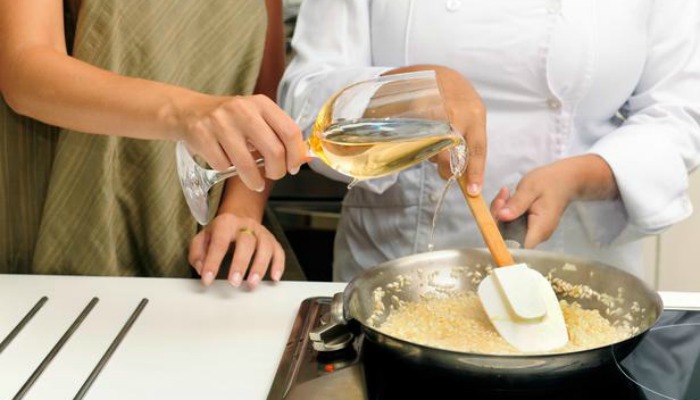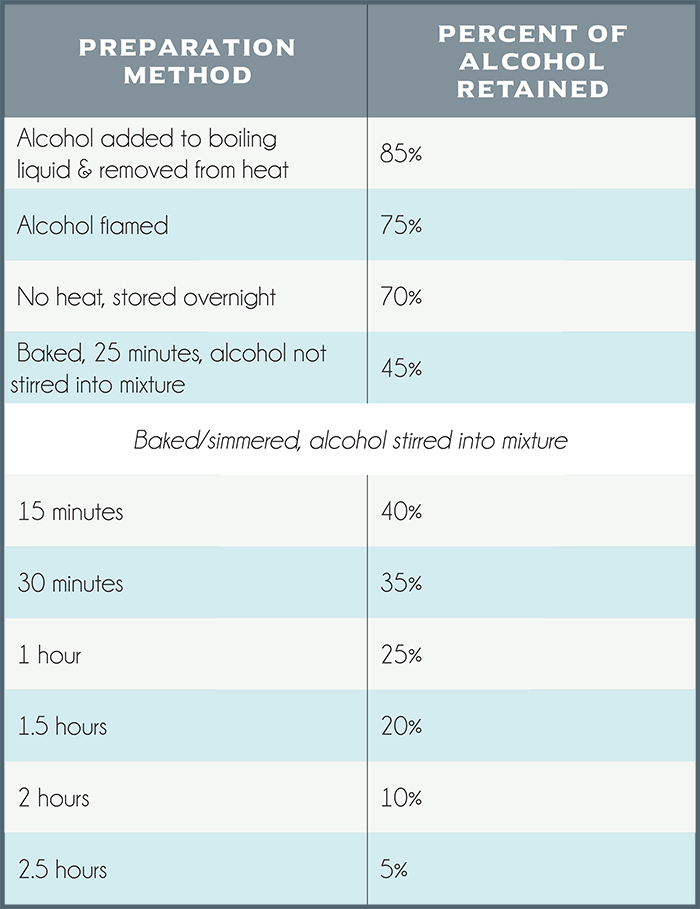
Cooking with alcohol is a practice that has been used for hundreds, if not thousands, of years, mostly to enhance flavor. For most, adding a little beer or wine to a dish is not a problem, but what about for members the Church?
In reality, we have all probably had some meat, sauces or fancy dishes that called for alcohol and thought nothing of it. Most of us have probably believed that it was okay because “all the alcohol gets burned out.” That’s what we heard from many — even cooking experts.
Does it Really Burn Out?
Unfortunately, that’s not the case. The wine or beer you’ve been cooking with did not all evaporate or dissipate, unless you’ve been cooking your dish for at least a good three hours.
The alcohol remaining in your cooking can vary anywhere from 5 percent to 85 percent. That all depends on the amount of alcohol added, the amount of heat applied, the cooking and standing time and the physical dimensions of the cookware.
If your purpose is to put on a show for your customers, creating a little flame is entertaining. However, if you’re trying to reduce the amount of alcohol in a dish, the best method is to simmer or bake the dish in a wide uncovered pan for an extended period of time.
A study conducted by the US Department of Agriculture’s Nutrient Data Laboratory calculated the percentage of alcohol remaining in a dish based on various cooking methods. The results are shown in the chart below:
 Source: USDA Table of Nutrient Retention Factors, Release 6
Source: USDA Table of Nutrient Retention Factors, Release 6
What Does the Church Say?
If you’re not baking your dish for three hours to cook off all the alcohol, are you breaking the Word of Wisdom?
President David O. McKay once had an experience with rum cake when he attended a reception.
At a reception McKay attended, the hostess served rum cake. “All the guests hesitated, watching to see what McKay would do. He smacked his lips and began to eat.” When one guest expostulated, “‘But President McKay, don’t you know that is rum cake?’ McKay smiled and reminded the guest that the Word of Wisdom forbade drinking alcohol, not eating it.”
McKay’s point was simple and refreshing: Don’t get hung up on the letter of the law to the point where you squeeze all of the spirit out of life.
On the other hand, in March 1973, Church News wrote, “Many recipes call for the use of wines or liquors. Even if the alcohol is evaporated through the cooking process, the taste for alcohol is cultivated by those who learn to enjoy the product.”
Not entirely black and white, right? The truth is, there is no specific guideline in the Church handbook on whether it is okay to use alcohol-based liquids in our cooking.
Alcohol Substitutions
For those that believe it is better to be safe than sorry, below are substitutions to recipes that call for various types of alcohol:
- Amaretto – Non-Alcoholic almond extract. Substitute 1/4 to 1/2 teaspoon almond extract for 2 tablespoons Amaretto.
- Anisette – Anise Italian soda syrup or fennel. Also use the herbs anise or fennel.
- Beer or Ale – Chicken broth, beef broth, mushroom broth, white grape juice, or ginger ale.
- Bourbon – 1 1/2 to 2 teaspoons of non-alcoholic vanilla extract.
- Brandy – Water, white grape juice, apple cider or apple juice, diluted peach or apricot syrups. Substitute equal amounts of liquid.
- Champagne – Ginger ale, sparkling apple cider, sparkling cranberry juice, or sparkling white grape juice.
- Coffee Liqueur – To replace 2 tablespoons of liqueur, use 1/2 to 1 teaspoon of chocolate extract mixed with 1 teaspoon of Pero® or Postum® powder, which has been mixed in 2 tablespoons of water.
- Cognac – Juice from peaches, apricots, or pears.
- Cointreau – Orange juice or frozen orange juice concentrate.
- Creme de menthe – Spearmint extract or oil of spearmint diluted with a little water or grapefruit juice.
- Grand Marnier or Orange-Flavored Liqueur – Unsweetened orange juice concentrate or orange juice. Substitute 2 tablespoons unsweetened orange juice concentrate or 2 tablespoons orange juice and 1/2 teaspoon orange extract for 2 tablespoons Grand Marnier.
- Kahlua – Coffee or chocolate-flavored liqueur. Substitute 1/2 to 1 teaspoon chocolate extract or substitute 1/2 to 1 teaspoon Pero® or Postum® powder in 2 tablespoons water for 2 tablespoons Kahlua.
- Kirsch – Syrup or juices from cherries, raspberries, boysenberries, currants, or cider. Substitute equal amounts of liquid.
- Peppermint Schnapps – Non-alcoholic mint or peppermint extract, mint Italian soda syrup, or mint leaves.
- Port Wine, Sweet Sherry, or Fruit-Flavored Liqueur – Orange juice or apple juice. Substitute equal amount of liquid.
- Rum (light or dark) – Water, white grape juice, pineapple juice, apple juice or apple cider, or syrup flavored with almond extract. Substitute equal amounts of liquid.
- Sake – Rice vinegar.
- Sherry or Bourbon – Orange or pineapple juices, peach syrup, or non-alcoholic vanilla extract. Substitute equal amount of liquid 1 to 2 teaspoons vanilla extract.
- Southern Comfort – Peach flavored nectar combined with a small amount of cider vinegar.
- Tequila – Cactus juice or nectar.
- Triple Sec – Orange juice concentrate, orange juice, orange zest or orange marmalade.
- Vermouth, Dry – White grape juice, white wine vinegar, or non-alcoholic white wine.
- Vermouth, Sweet – Apple juice, grape juice, balsamic vinegar, non-alcoholic sweet wine, or water with lemon juice.
- Whiskey – If a small amount is called for, it can be eliminated.
- Vodka – White grape juice or apple cider combined with lime juice or use plain water in place of the vodka.
- Claret – Diluted grape juice or cherry cider syrup.
- Gewurztraminer – White grape juice combined with lemon juice.
- Grappa – Grape juice.
- Port Wine – Concord grape juice with some lime zest added, cranberry juice with some lemon juice added, or grape juice concentrate. Substitute orange juice or apple juice for lighter ports.
- Red Wine – Red grape juice, cranberry juice, chicken broth, beef broth, vegetable broth, clam juice, fruit juices, flavored vinegar. Substitute equal amount of liquid.
- White Wine – Water, chicken broth, vegetable broth, white grape juice, ginger ale, white grape juice.
- Sweet White Wine – White grape juice plus 1 tablespoons Karo corn syrup. Substitute equal amount of liquid.
How have you adapted your recipes that call for alcohol? Let us know in the comments below.





